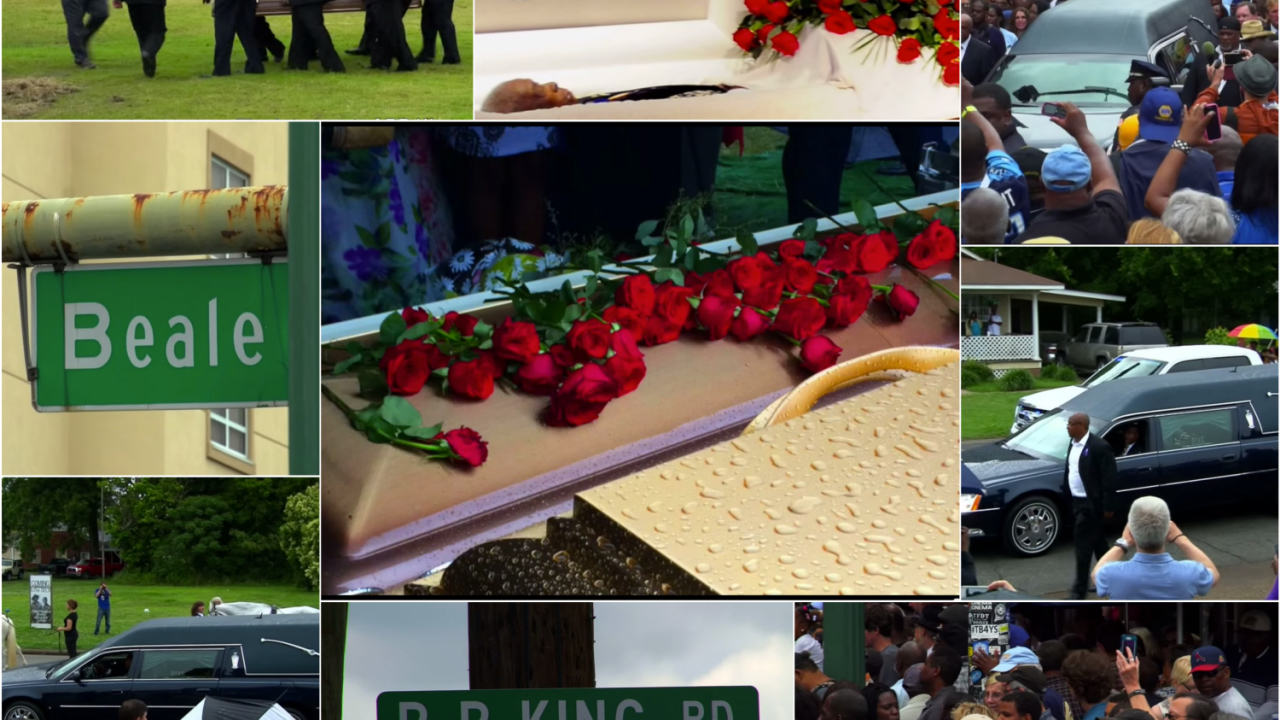Video Exclusive: BB King's Journey Home
Film-maker Jon Brewer, the director of official BB King documentary The Life Of Riley, went to chronicle the blues master's funeral. We have an exclusive edit.

“I really had a good relationship with B.B. King,” remembers Brewer, “and I always thought deeply about what he said to me. He made several references to death. He once said, ‘Death is a wonderful thing’. He wasn’t worried about it – but he thought he was nearing the end.”
Though King himself never gave Brewer a verdict on The Life Of Riley, the film’s universal acclaim made the director a shoo-in to capture the events of late-May, when the bluesman’s body travelled across the US South. “B’s funeral was spread over 11 days,” he recalls, “and there was a big problem, because as you know, [manager] LaVerne Toney was accused of poisoning him. And immediately – whether it’s fact or fiction – that basically freezes where the body is. And there was talk of the body not going to Memphis. “So we jumped on an aeroplane, not knowing whether there was even going to be a funeral. But we were relieved to know that when we landed, the body was on its way too. So that morning – on Wednesday [27th May] – there was a procession down Beale Street. And Beale Street was very important to B.B. King, because in the early days, that’s where he made his mark. That’s where he played for a dollar. That’s where he created the Blues Boy, really.”
“The procession was preceded by a tribute in Handy Park, which was packed, obviously. There was a minute’s silence and his old musicians came out on the stage: just wonderful. Then the hearse came down, surrounded by security, musicians, anybody that could tag along. I’d guess that probably 5000 people turned up: you couldn’t move. And in front of the hearse was a typical band you’d find in the South, with the old tubas and saxophones. “It came down Beale Street, literally at a snail’s pace. And then, at the end, it turned onto 3rd and got picked up by the Tennessee police, who surrounded it with an escort and took it out onto Highway 51. I grabbed my camera people and managed to get up in front of the procession to the state line. And that’s when it hit me. Because I saw B go over the line for the last time. It was his last homecoming. He always said to me that [one day] he’d be dead and then they would carry him over the state line. I’m not ashamed to say a tear came to my eye.
“So off he went to Indianola. It’s a very small town, and in the morning [Friday 29th], I drove in and there was no-one on the streets. It was like a bomb had gone off. Then I turned onto B.B. King Road, and they were all lining up, the whole town. And you suddenly realise, the respect for this man. They were so proud he came from that place. We were one of the few people allowed in to film, and we filmed the procession as it came through, very quietly, past B.B. in the open casket. He lay there very peacefully. It’d been about ten days that he’d been dead, but he looked actually quite well. “The following morning we got down there at the crack of dawn, to the [Bell Grove Missionary Baptist Church]. We managed to film from a feed that Mississippi television gave us, for the actual service, which took three hours. It was a bit of a circus. There were people there who’d done albums with him and everything else. And the family: there’s so many of them. Don’t forget, he had fifteen children by fifteen different women. So you had all of that. “He lay in state for the whole service, until they closed the casket and took it into the hearse. There had been rain forecast, and there’d been a few showers, nothing much. But as the procession was leaving the church, there was a tornado warning siren, and a wind like I’ve never experienced in my life before. The cameraman went backwards. My hat flew off. A cop in the middle of the street was hit by something. It was almost like the Holy Spirit had flown down that road. And the procession was stopped. So filming in the church was easy. The most difficult thing was the filming of the procession afterwards, because that wind was the most extraordinary thing. “Then the procession came, with two white horses leading it, and one beautiful black horse carrying Lucille. The guitar was strapped to the back of the horse: that was his request. B hated graveyards, wouldn’t set foot in them. His request was that he be laid to rest next to the B.B. King Museum. When it got to the burial ground, they laid the coffin in the casket, and it was lowered into the ground. “My hand was the last on the coffin as it went down. And I just said, ‘Thank you’. I just felt like we had lost something that was so incredibly important, that had done so much for the blues, rock ‘n’ roll, and any other type of music you can think of. B.B. King affected us all. It was like a goodbye to someone who was divine…”
The latest news, features and interviews direct to your inbox, from the global home of alternative music.
Henry Yates has been a freelance journalist since 2002 and written about music for titles including The Guardian, The Telegraph, NME, Classic Rock, Guitarist, Total Guitar and Metal Hammer. He is the author of Walter Trout's official biography, Rescued From Reality, a music pundit on Times Radio and BBC TV, and an interviewer who has spoken to Brian May, Jimmy Page, Ozzy Osbourne, Ronnie Wood, Dave Grohl, Marilyn Manson, Kiefer Sutherland and many more.

